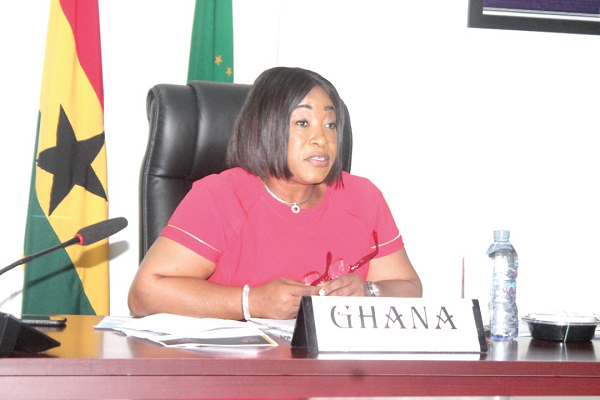
Identify best practices to tackle climate change— President
President Nana Addo Dankwa Akufo-Addo has called on African governments to come together and identify best practices to deal with climate change.
At the sub-regional level, he said, the Economic Community of West African States (ECOWAS), in line with the decision of the Authority of Heads of State and Government in 2015, set up a national early warning and response mechanism in each member state to enhance their capacity to address major risks such as security and terrorism, the environment, crime and criminality, governance and health.
“As of today, five centres in Burkina Faso, Cote d’Ivoire, Guinea Bissau, Mali and Liberia are fully operational, while the remaining are at various levels of completion,” the President said.
This was contained in an address read on the President’s behalf by the Minister of Foreign Affairs and Regional Integration, Ms Shirley Ayorkor Botchwey, at a Peace and Security Council meeting of the African Union (AU).
The virtual event discussed sustainable peace in Africa, focusing on climate change and its effect on peace and security on the continent, among other sectors.
Among the objectives, the meeting was to examine the conditions that gave rise to current iterations of violence and also assess whether policy measures and strategies adopted at the international, regional and national levels were bringing the continent closer to sustainable peace.
Regional stability
President Akufo-Addo said in sub-Saharan Africa, including South Asia and Latin America, climate change-driven population displacement, migration, water and food insecurity had the tendency of undermining regional stability, hence the need to forge stronger partnerships to find solutions to the challenges.
He also said socio-economic difficulties, political and economic exclusion, mismanagement, drought, corruption, nepotism, unemployment, religious extremism, transnational crimes, drug trafficking and external political interference in the affairs of African countries were some of the factors identified by the AU as the main causes of instability on the continent.
According to the President, scholars and practitioners engaged in conflict resolution and management had agreed that the effects of climate change extended beyond environmental impact into a complex intersection with economics, social development and security.
Policy
President Akufo-Addo said in 2013, Ghana developed a national climate change policy to serve as a spring board for initiating a climate-resilient economy to accelerate its development effort and also enhance the well-being of the people, without sacrificing the quality of the environment and its resources.
The policy, he said, affirmed the resolve to lessen the potential hardships that climate change impact might pose to the sustainable development of the country.
“The policy seeks to provide strategic directions to coordinate issues of climate change in the country, bearing in mind its relation to development. What is relevant for the country is to ensure the mainstreaming of the climate-proofing agenda into national development,” the President said.
“Long-lasting and enduring peace must of necessity become more climate-sensitive by assessing climate-related security risks, increasing cross-agency knowledge exchange and learning, maximising synergies, engaging with communities, strengthening the state’s ability to provide services and enabling climate-sensitive development,” he said.
President Akufo-Addo said such an approach, if properly implemented, could aid conflict prevention by mitigating local grievances and reducing marginalisation, which he said were becoming increasingly the root causes of conflicts.
